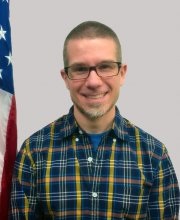Total Credits: 14
This workshop will be highly experiential with a focus on helping participants practice and build skills that they can readily integrate into their work with military clients. It’s designed to give participants a strong foundation in Acceptance and Commitment Therapy (ACT) theory and practice. The workshop is ideal for beginning practitioners new to the model as well as those already practicing ACT at an intermediate level who want to broaden their repertoire.
Over the course of two days, we will work with participants to assess psychological problems using the Psychological Flexibility model, learn and practice skills relevant to each of the 6 core psychological flexibility processes, use the ACT skills to help clients differentiate between ineffective and meaningful actions, and to identify and address key indicators of psychological inflexibility. In addition, the training will explore the ways in which language and metaphor influence behavior and can be used in therapy to help change behavior. We will use experiential exercises, small group work and dyad work to encourage participants to practice and enhance new skills.
Acceptance and Commitment Therapy (ACT)
AGENDA
Day One
|
Introductions, Opening Exercise |
9:00am – 9:30am ET
|
|
Idiographic Assessment using the Matrix |
9:30am – 11:00am ET |
|
Break |
11:00am – 11:15am ET |
|
Foundations: ACT in Historical Context, Functional Contextualism, Core Yearnings |
11:15am – 1:00pm ET |
|
Lunch |
1:00pm – 2:00pm ET |
|
Foundations: Relational Frame Theory, Psychological Inflexibility Processes
|
2:00pm – 3:30pm ET |
|
Break
|
3:30pm – 3:45pm ET |
|
Pretreatment Assessment, Informed Consent, and Preparing Clients for ACT |
3:45pm – 5:30pm ET
|
Day Two
|
Opening Exercise
|
9:00am – 9:15am ET |
|
Open Skills: Cognitive Defusion and Acceptance |
9:15am – 11:00am ET |
|
Break
|
11:00am – 11:15am ET |
|
Aware Skills: Flexible Attention to Present Moment and Perspective Taking |
11:15am – 1:00pm ET |
|
Lunch |
1:00pm – 2:00pm ET |
|
Engage Skills: Values Clarification and Committed Action |
2:00pm – 3:30pm ET |
|
Break |
3:30pm – 3:45pm ET |
|
ACTplications to Military Clients: Case conceptualization, Research related to ACT and military clients, peer-to-peer consultation |
3:45pm – 5:30pm ET |
| Presentation Slides (15.5 MB) | 180 Pages | Available after Purchase |
| ACT Handouts Combined (318.3 KB) | 20 Pages | Available after Purchase |

Andrew Santanello, Psy.D is a licensed, clinical psychologist. Dr. Santanello worked in the Department of Veterans Affairs as a PTSD specialist for over a decade before moving to his current position as a Military Behavioral Health Psychologist, PTSD subject matter expert, and National Cognitive Processing Therapy trainer at the Center for Deployment Psychology. Although Dr. Santanello has extensive expertise with "second-wave" CBT interventions such as CBT-D, Prolonged Exposure Therapy, and Cognitive Processing Therapy, his passion for "third-wave" behavioral interventions, such as Acceptance and Commitment Therapy, is a common thread throughout his professional career. His professional interests include dissemination and practice of Evidence-Based Psychotherapy with an increasing focus on mechanisms of change and process-based psychotherapy, psychological
Maj John A. Blue Star is a Clinical Health Psychology Fellow for the 59th Medical Operations Squadron at Joint Base San Antonio, Lackland. His duties include conducting biopsychosocial evaluations for active duty and their families and retirees with health conditions, coordinating community-level population health program initiatives, providing behavioral treatment to individuals and groups with focus on quality of life improvement, and supervising clinical activities and conducting didactics for psychology interns. Maj Blue Star has specialty focus in implementing interdisciplinary care for Active Duty service members with chronic pain and associated functional impairments, with emphasis on improving military readiness and decreasing risks involving opioid medication. Maj Blue Star serves as the President Elect for the Association of Contextual Behavioral Sciences ACT for Military SIG and has been accepted as a member of the Motivational Interviewing Network of Trainers (MINT). Maj Blue Star completed his doctorate in Clinical Psychology in 2015 from Brigham Young University in Provo, Utah. He joined the Air Force as a Health Professions Scholarship Program recipient in 2012 and commissioned in July 2014. Prior to his current position, he served as the ADAPT Program Manager, Suicide Prevention Program Manager, and Disaster Mental Health Team Chief at MacDill AFB in Tampa, Florida.
Maj David Tubman an active duty US Air Force clinical health psychologist, currently serving as the Clinical Psychology Internship Training Director at Wright-Patterson AFB, Ohio. He earned his Psy.D. at Wheaton College, Illinois, and completed both his internship and post-doctoral fellowship in clinical health psychology at Wilford Hall Medical Center, Lackland AFB, TX. Since joining the USAF in 2010, he has served in a wide range of leadership roles, to include Flight Commander, substance abuse and Mental Health Element Leader, and Director of Psychological Health. Maj Tubman has dedicated his career toward training in psychology and provided such for healthcare providers across the globe, to include the US, Germany, Canada, Africa, The Republic of Georgia, and Japan. Maj Tubman is a member of the Motivational Interviewing Network of Trainers (MINT), and is a very involved member of the Association of Contextual Behavioral Sciences (ACBS), including being the founder and past president of the ACT for Military ACBS Special Interest Group. He is passionate about delivering evidence-based population health interventions, developing effective and engaging clinical training experiences, the science of behavior change, and Acceptance and Commitment Therapy (ACT).
| Availability | Module Title | Credits | Course Type | Duration | Course Details | ||||||||||||||||||||||||||||||||||||||||||||
|---|---|---|---|---|---|---|---|---|---|---|---|---|---|---|---|---|---|---|---|---|---|---|---|---|---|---|---|---|---|---|---|---|---|---|---|---|---|---|---|---|---|---|---|---|---|---|---|---|---|
| Nov 12, 2020 @ 09:00 AM (EST) |
Acceptance and Commitment Therapy Day 1
|
N/A | Webinar | 8 Hours 30 Minutes | More info » | ||||||||||||||||||||||||||||||||||||||||||||
| Nov 13, 2020 @ 09:00 AM (EST) |
Acceptance and Commitment Therapy Day 2
|
N/A | Webinar | 8 Hours 30 Minutes | More info » | ||||||||||||||||||||||||||||||||||||||||||||
| Total Classroom CE Credits Information | |||||||||||||||||||||||||||||||||||||||||||||||||